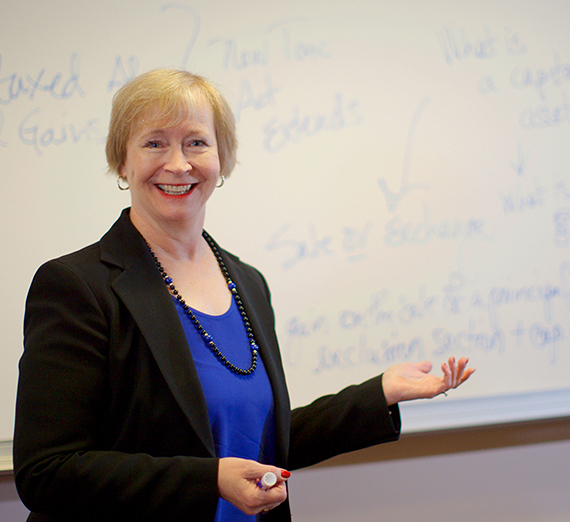Law Professor Ann Murphy Cited with Experts in Recent Supreme Court Ruling

The U.S. Supreme Court case Green v. Biddle, 21 U.S. (8 Wheat.) 1 (1823) is landmark for a simple reason: it marks the first time amicus curiae briefs were filed with the U.S. Supreme Court—it also marks the first year the Court accepted written briefs, period. Now, amicus briefs are almost a requisite part of a U.S. Supreme Court appeal but “[a]ttitudes within the legal community about the utility and impact of amicus briefs vary widely.”
But Gonzaga Law’s Professor Ann Murphy has a pretty good idea. Murphy joined other tax law and economics professors from around the nation in an amicus brief in South Dakota v. Wayfair, Inc. et al., 585 U.S. ___ (2018) on behalf of the petitioner. Murphy and amici argued, in part, that “in light of changed competitive conditions and evolving economic understandings,” Quill Corp. v. North Dakota, the U.S. Supreme Court’s own precedent on this issue, should be overturned.
“I am fortunate to know colleagues in tax and economics at many schools," Murphy said. "When asked to join in on the brief, I jumped at the chance. It is a thrill that our brief was cited by the majority."
Twenty-six years ago in Quill Corp. v. North Dakota, the Court exempted out-of-state vendors from taxation based on the Dormant Commerce Clause. For those of you who may have nodded off in ConLaw I, the Dormant Commerce Clause provides that, absent a federal law holding otherwise, state laws that encourage intra-state transactions and discourage inter-state transactions should be struck down because they inhibit free and open interstate commerce.
In Wayfair, South Dakota argued that it was losing significant tax dollars because of the tax breaks provided to online vendors and that current software can handle the complicated tax computations of state and local tax schemes. Brick and mortar businesses also argued for equality when it came to taxing sales.
The professors pointed out that the revenue loss at the time Quill was decided was approximately $3.27 billion across the fifty states. Now, however, the tax losses to state and local governments was $33.9 billion in 2018 and was projected to rise to $51.9 billion by 2022. In addition, Quill discouraged businesses from expanding across state lines and did nothing to actually ease the burden of calculating the taxes. The staggering tax loss would have a devastating impact on state and local governments and would discourage the Dormant Commerce Clause’s goal of economic union. Further, modern software eased the burden of computing the taxes owed according to state and local tax schemes.
The U.S. Supreme Court agreed, specifically citing the professors’ amicus brief on page 19 and 22 of its opinion and ruled that states have a right to charge sales tax for online transactions by out-of-state companies with no physical presence in the state itself.
"Of course no one wants more taxes," Murphy said, "but our whole way of purchasing items in this country has changed. [The ruling] treats online retailers and in-state retailers the same."
--------
Joseph D. Kearney and Thomas W. Merrill, The Influence of Amicus Briefs on the Supreme Court, 148 U. PA. L. REV. 743, 745 (2000).
